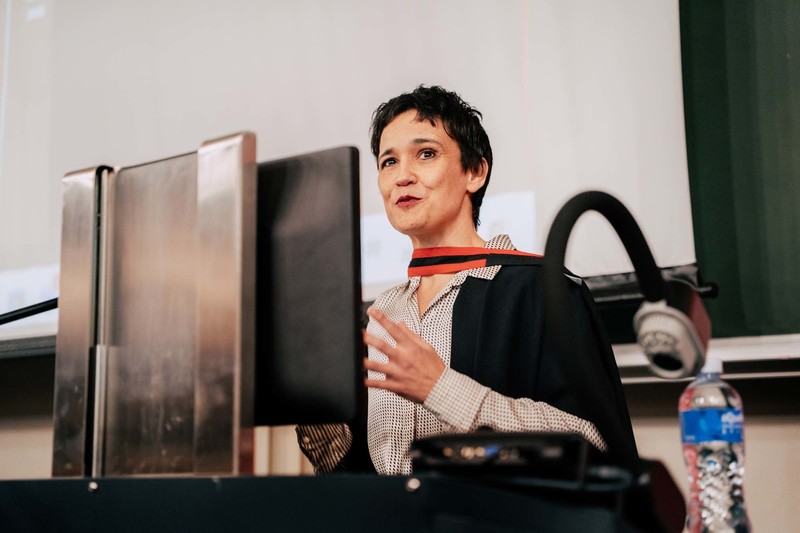Blood, grit, and global breakthroughs
01 September 2025 | Story Myolisi Gophe. Photo Robyn Walker. Read time 7 min.
The patient sneezed, and a spray of blood exploded into Professor Darlene Lubbe’s face. She was still a young doctor then, standing over a man with uncontrolled nosebleeds, when the reality of surgery hit her most viscerally.
“It went straight into my eyes and mouth,” she recalled during her inaugural lecture at the University of Cape Town (UCT) on August 28. “I had to swallow it down and keep going. That’s when you realise: this is not glamorous. This is grit.”
That moment – messy, human, unforgettable – set the tone for the lecture, titled “Otolaryngology Through a South African Lens – Journeys, Innovations and Global Perspectives”, that traced her path from an uncertain medical student once dismissed as a “dark horse” to a pioneering surgeon whose innovations in head and neck surgery have changed lives across Africa and the world.
During her talk, Professor Lubbe admitted she was never the star student. “I was happy with 65%,” she said, to some huge laughter from the audience, which included her patients, colleagues, students, and family. But everything shifted when she encountered surgery. “Suddenly, there was nothing they could ask me that I hadn’t read. I just loved it.”
Her passion carried her to the surgery prize, though not without raised eyebrows from classmates who wondered where this sudden drive had come from. She turned down a fast-tracked post in neurosurgery because her heart wasn’t in it. “I wanted to do what I loved,” she explained, crediting her father, a cardiac surgeon, for early lessons in teamwork and precision.
The journey was not without failure. Lubbe recalled flunking an exam and disappearing for months out of shame. That vulnerability, she said, has helped her understand her own students’ struggles.
Sport, too, shaped her resilience. A national-level athlete who competed at world championships, she drew on the stamina and focus she had honed on the track. “Sport during your career makes a massive difference,” she reflected. “It teaches you how to balance long hours and still show up the next day.”
Her inaugural lecture provided insight into how teamwork and mentorship can drive success.
The power of mentorship
Mentorship, she stressed, was the cornerstone of her development. She spoke with reverence of Professor Heinz Stammberger, the late Austrian surgeon known as the “God of sinus surgery”, whose generosity of spirit she has tried to emulate.
One story illustrated mentorship’s ripple effect powerfully. More than two decades ago, a young mother with aggressive nasal cancer came under Lubbe’s care. Without access to modern navigation systems, she performed a pioneering procedure with international guidance. Today, that patient is alive, cancer-free, and was sitting in the audience with her grown daughters. “That is the value of mentorship,” Lubbe said. “You may never know the thousands of lives you save through others.”
Lubbe devoted much of her lecture to the colleagues who made her breakthroughs possible. She recalled her long partnership with Sister Reetsberg, a scrub nurse who worked beside her for nearly two decades. “We had a sign language that no one else could understand,” she said warmly. “She knew exactly what instrument I needed before I asked. That’s what teamwork looks like.”
“We had a sign language that no one else could understand. She knew exactly what instrument I needed before I asked. That’s what teamwork looks like.”
She also paid tribute to neurosurgical partners who embraced endoscopic techniques when she was still operating with a headlamp and microscope. “The microscope never came back,” she laughed. “And from there, we built something unique.”
South Africa’s resource-constrained environment became an unlikely crucible of innovation. Faced with long waiting lists and complex cases, Lubbe and her team developed novel approaches that are now attracting global recognition.
Among them: reducing the duration of skull-base tumour surgeries by building 3D models and working in parallel through the nose and orbit. The approach dramatically shortened operations while preserving patients’ vision. At first, she dismissed it as “just what we do”. But colleagues abroad urged her to publish, recognising its significance.
Another advance came in airway management for children misdiagnosed with asthma but actually suffering from subglottic stenosis. Instead of condemning them to invasive tracheostomies, Lubbe’s team refined balloon dilation techniques. “We’ve now done over 400 cases,” she said, noting the innovation won international recognition and a United States medical design award. “It’s changed the game for these patients.”
Most recently, she has led efforts to treat hereditary hemorrhagic telangiectasia, a rare disorder that causes devastating nosebleeds. Traditional treatment involved suturing the nose shut, forcing patients to breathe only through their mouths. Lubbe’s bold alternative – injecting targeted sclerotherapy agents under direct vision – has transformed lives. “The results have been phenomenal,” she said. “Patients who were housebound from constant bleeding are now living normal lives.”
A pioneer of transorbital surgery
Beyond these advances, Lubbe has carved a global reputation in the development of transorbital surgical techniques, working through the eye socket to reach tumours and other conditions at the skull base. She was one of the first otolaryngologists in the world, and the first female eyes, nose and throat (ENT) surgeon to help advance this approach in collaboration with Professor Kris Moe at the University of Washington.
“We didn’t train them to do it like us. We trained them to do it better than us. And that’s exactly what they’re doing.”
Her work has resulted in numerous surgical “firsts”, several novel techniques, and training modules that now shape the field worldwide. She directs the Karl Storz Sub-Saharan Endoscopic Sinus and Skull Base Surgery Programme and trains surgeons internationally, running advanced courses to expand expertise across continents.
Of all her achievements, Lubbe said she is most proud of her role in training surgeons across Africa. Through fellowships and international partnerships, she has helped doctors from Kenya, Namibia, Oman, Turkey, and elsewhere develop skills they are now using to lead their own surgical units.
“We didn’t train them to do it like us,” she said. “We trained them to do it better than us. And that’s exactly what they’re doing.”
Despite her pioneering reputation, Lubbe’s tone remains strikingly humble. She credits teams and mentors at every turn. “If you don’t work with a team, you can’t have an impact,” she said simply.
Her philosophy, she added, is shaped by faith and gratitude. She quoted Proverbs 18 as a guiding light and described every advance as “a gift born of necessity, persistence, and community”.
Prestigious offers have followed her, including a recent post in Australia, but Lubbe has chosen to stay in South Africa. “This is where I’m meant to be,” she said. “Building surgical capacity here matters more than anything else.”
After recounting surgical triumphs, gruelling eight-hour procedures, and patients who walked out alive against the odds, Lubbe closed her lecture with characteristic humility. “I absolutely love what I do,” she said. “And I’ve been incredibly lucky – lucky to learn from great mentors, lucky to work with amazing teams, and lucky to do work that saves lives. That’s all I could ever have wished for.”
 This work is licensed under a Creative Commons Attribution-NoDerivatives 4.0 International License.
This work is licensed under a Creative Commons Attribution-NoDerivatives 4.0 International License.
Please view the republishing articles page for more information.
















